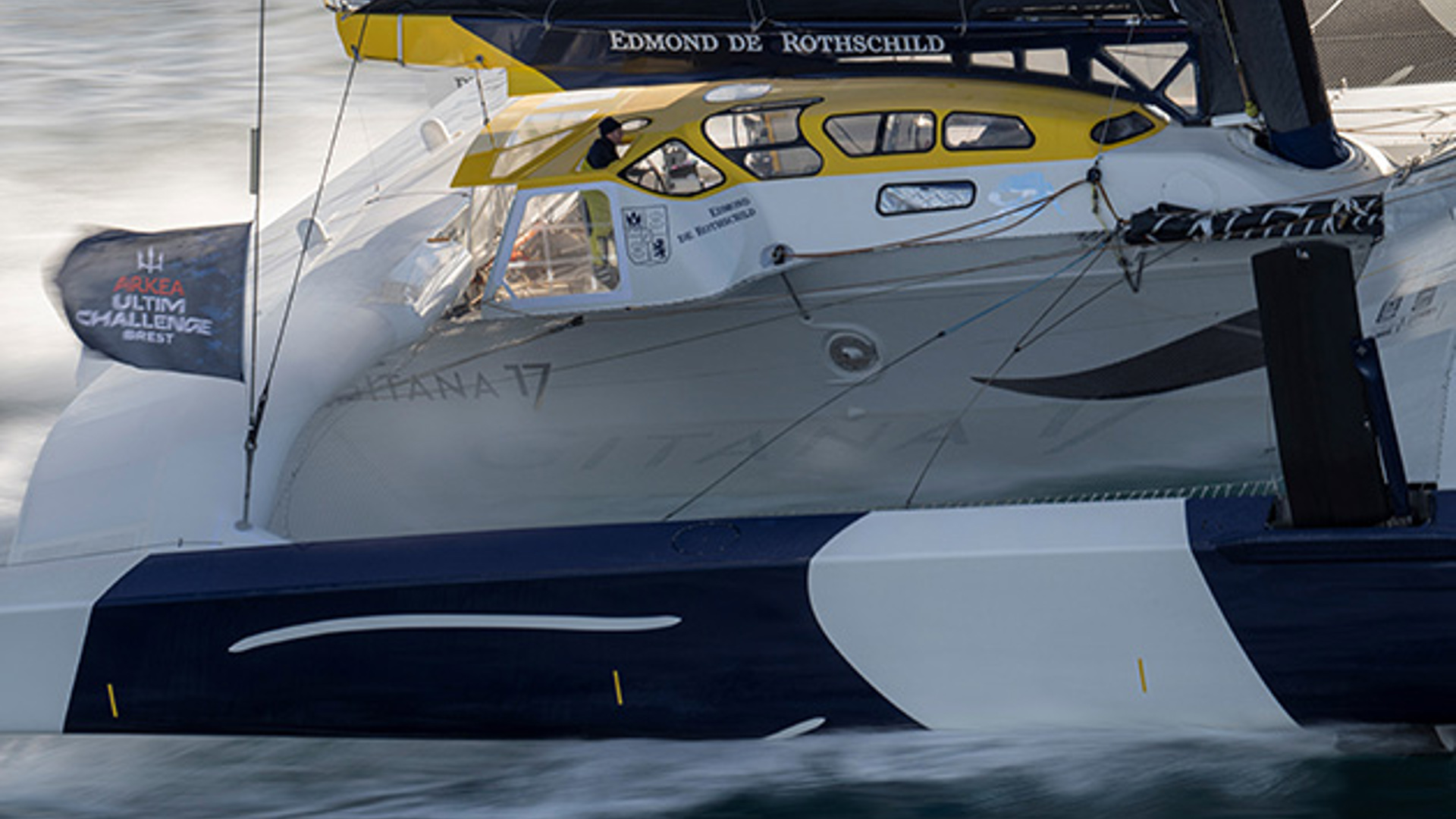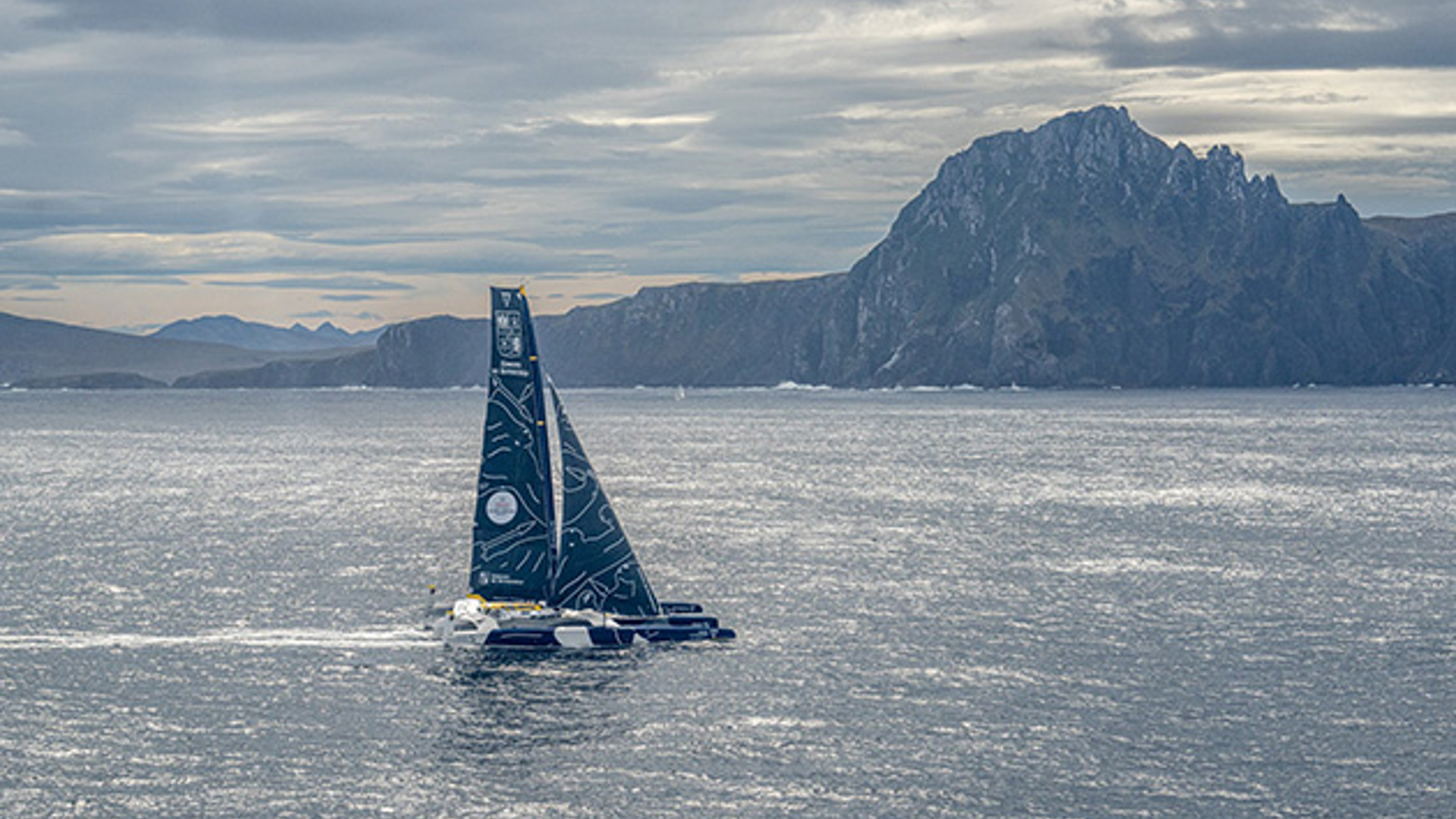Tuesday, February 27, 2024 - This Tuesday, February 27 at 8h 37min 42s, Charles Caudrelier crossed the finish line of the Arkea Ultim Challenge-Brest. At the helm of the Maxi Edmond de Rothschild, the skipper of Gitana Team, who celebrated his fiftieth birthday yesterday, won this pioneering race, and completed his first solo circumnavigation in 50 days 19 hours 7 minutes, 42 seconds at an average speed of 23.74 knots, for a distance actually covered of 28,938 miles. An accolade he shares with Ariane de Rothschild and the entire team founded in 2000 by Benjamin de Rothschild.
During his 50-odd days at sea, Charles Caudrelier demonstrated exceptional mastery and commitment aboard his 32-meter Ultim, the first flying boat to successfully circumnavigate the globe via the three capes. This personal sporting achievement also rewards the audacity of a visionary team, who 10 years ago, with the architect Guillaume Verdier, imagined the design of a large trimaran capable of "foiling" on the high seas.
Ariane de Rothschild, founder and owner of Gitana Team: "First of all, I'd like to congratulate and thank Charles Caudrelier for completing and winning this round-the-world race in such an exceptional way. I'm also thinking of the Gitana teams who have accompanied him and lived this adventure at his side with such intensity and determination. This race has been very demanding for both sailors and boats, which makes this first solo Ultim round-the-world race all the more impressive. I also wanted to say how moved I am by this boat, Gitana 17. We imagined and designed her with the ambition of being the first maxi-trimaran to fly around the planet. It's done, and it's a total consecration. I'm thinking of Guillaume Verdier, his teams, the Gitana design office and Cyril Dardashti, without whom this magnificent boat would not exist. With this dazzling victory, the Maxi Edmond de Rothschild enters the great family tradition and the legend. It's very touching and emotional”.
Cyril Dardashti, Managing Director of Gitana Team: "It's a great moment for all of us, for the team, for Charles, for our owner. It's the reward for 10 years' work. It's our first successful round-the-world race with the team. To do it in a multihull, which is in the Gitana Team's DNA, and to win it in flying mode, is the most beautiful star we can hang on our board. Charles has been monstrous from the start of this race. We had no doubt. He's done something incredible. He's showing his peers what a great sailor he is."


Charles's race: what you need to remember
Atlantic contact:
The start on January 7, 2024 was followed by a grouped descent of the Atlantic. In the trade winds off Cape Verde, the regatta between four of the six competitors soon turned into a duel with SVR Lazartigue. This hand-to-hand duel with Tom Laperche reached its climax just outside the roaring forties. Charles Caudrelier clocked up three days at an average speed of almost 35 knots (838 miles for his best 24 hours). He took the lead on January 17, while his rival suffered major damage and was forced to retire.
Rounding the Cape of Good Hope:
January 19 at 14 h 32 min 22 sec, in 12d 1h 2min and 22s - in 1st position
An Indian record:
The Maxi Edmond de Rothschild is racing ahead of a low-pressure system off Brazil, which will propel her all the way to the Kerguelens. He's the only one in this position. With a weather system ahead of his pursuers, the gap is widening inexorably. The five-arrowed giant crossed the Indian in 8 days, 8 hours 20 minutes and 36 seconds.
Passing Cape Leeuwin:
January 25 at 19 h 14 min and 05 seconds, in 18 days 5 hours 44 minutes and 5 seconds of racing - in 1st position - New single-handed reference time.
Single-handed Indian Ocean record:
On January 28, Charles Caudrelier crossed the longitude of the South-East Cape at 1h03min and 10 seconds (French time) after 20 days 11 hours 33 minutes and 10 seconds of racing. He covered 6,113 miles between Cape Agulhas (South Africa) and the South-East Cape in 8 days 8 hours 20 minutes and 36 seconds, at an average speed of 30.7 knots.
Pacific: slow down to get out
Everything began perfectly in the long Pacific swell, which enabled the blue trimaran to make headway for four days at an average speed of over 30 knots. At the stern, the weather and damage hampered Thomas Coville (technical stopover in Tasmania) and Armel Le Cléac'h (forced to pass through northern New Zealand). But on February 1st, at the halfway point, Charles was forced to put both feet on the brake to avoid a virulent system that blocked his passage around Cape Horn. He spent 48 hours in slow motion. His 3500-mile lead over Sodebo protects him from a possible comeback.


Rounding Cape Horn:
February 6 at 18 h 08 min 40 seconds, after 30 days 4 hours 38 minutes and 40 seconds of racing - in 1st position
The final spikes of the Atlantic:
Probably the most difficult part of the race for Charles Caudrelier. The presence of ice, followed by the arrival of a final southern low-pressure system, forced him to pass to the west of the Falklands and temporize once more. Victim of a disabling technical problem (which he managed to repair), he also almost capsized, his boat listing at 40 degrees for several long seconds. The upwind passage along the South American coast was laborious. Finally, the North Atlantic put him to the test. On February 21, Charles was forced to stop in Horta (Azores), a strategic stopover that lasted over 72 hours, just long enough for the very bad weather off the French coast to pass.
Crossing the equator:
Charles Caudrelier crossed the equator for the 2nd time on his round-the-world voyage, on February 16, 2024 at 8 h 44 min 48 seconds, after 39 days, 19 hours, 14 min and 48 seconds of racing.
Equator outward / equator return time: 33 days, 11 h, 33 min.

